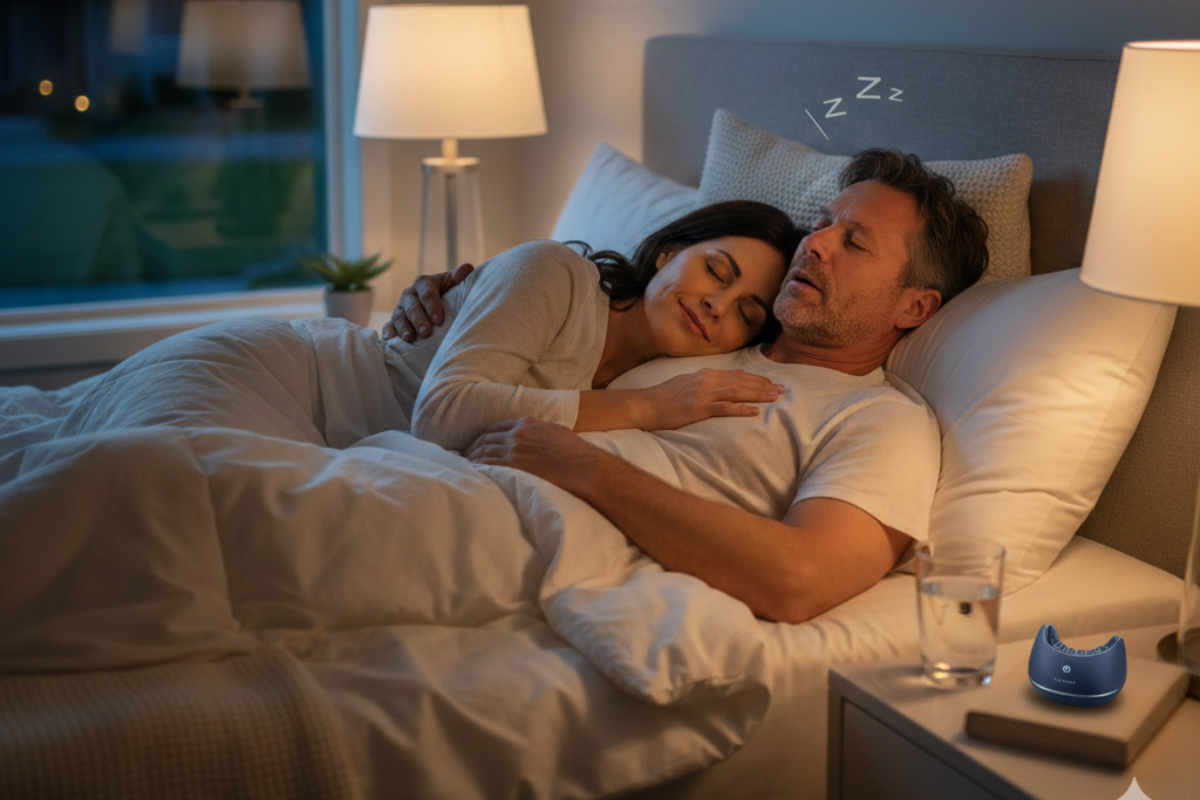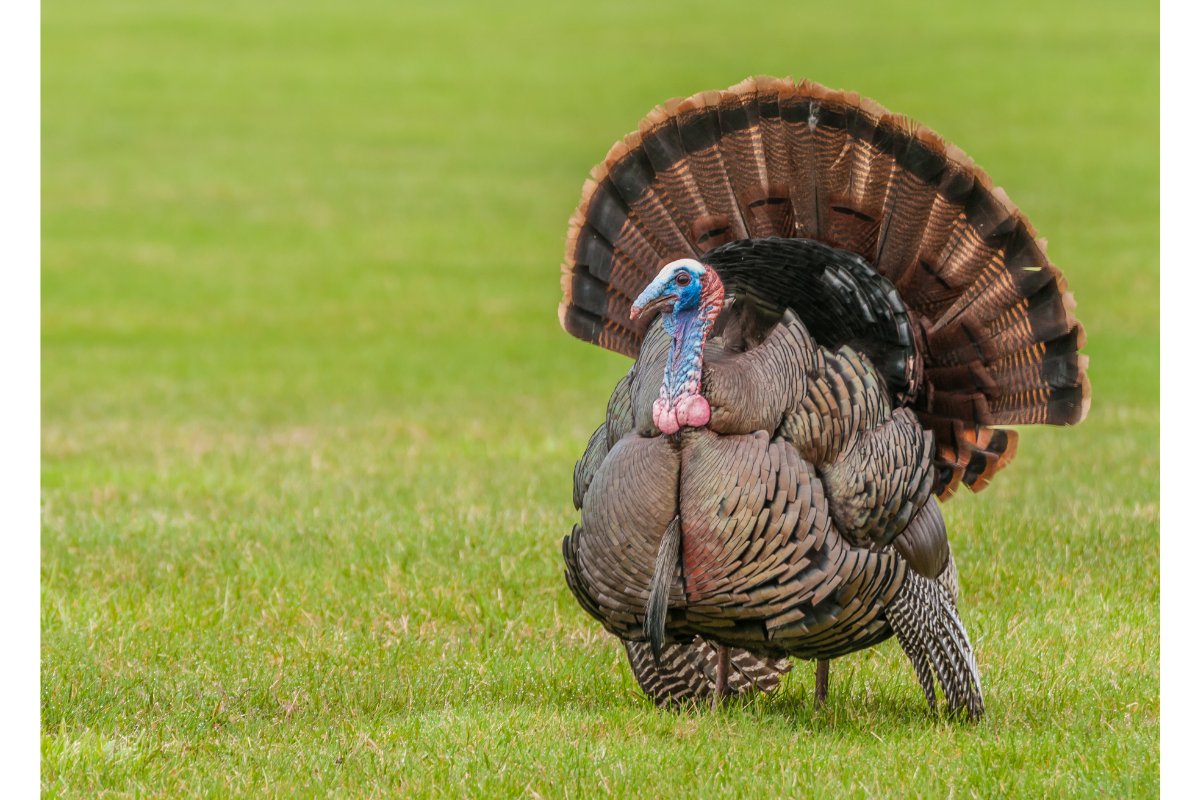Free Shipping - On Orders Over $175 (USA, Canada, UK, & AU)

If I Snore, How Do I Know If It’s Sleep Apnea?
June 19, 2022 4 min read
Not everyone who snores has sleep apnea, but nearly everyone with sleep apnea snores. If you suspect (or were told) that you snore, you may be wondering whether you should take that as a sign that you might have sleep apnea.
While sleep apnea can be diagnosed only with a sleep study — also called polysomnography — it also has many signs and symptoms that can serve as red flags. In this article, we discuss some of the most common sleep apnea signs to look out for. But first, let’s talk a bit about what sleep apnea is and how it differs from simple snoring.
What Is Sleep Apnea?
Sleep apnea is a sleep disorder characterized by breathing that repeatedly stops as you sleep. During a sleep apnea episode, the upper airway totally collapses, causing pauses in breathing for 10 seconds or more. This is usually followed by arousal from sleep as well as snorting, choking, or gasping sounds.
An interesting thing about sleep apnea is that sufferers are unaware they have it. Their bed partners or family members are usually the ones who notice their nightly bouts of loud snoring and other noise that’s keeping them up all night. And although sleep apnea sufferers aren’t aware of their problem as it’s happening, they still suffer as sleep apnea causes fragmented and unrefreshing sleep that put patients at risk of:
- Sleepiness
- Traffic accidents
- Hypertension
- Heart attack
- Stroke
- Diabetes
There are different types of sleep apnea, all with different causes. However, the most common type is obstructive sleep apnea (OSA), which affects 2 to 9% of adults and can significantly increase your risk of early death if left untreated.
Snoring vs. Sleep Apnea
Snoring and sleep apnea both result from an obstruction in the upper airway, causing noisy breathing during sleep.
However, in simple snoring, this obstruction is only partial and does not lead to pauses in breathing. In sleep apnea, however, tissues in the upper airway completely block airflow, leading to episodes in which breathing stops and restarts repeatedly. So, the main difference between the two is in the level of airway obstruction.
Snoring can progress to sleep apnea and is usually one of its first symptoms. While not as detrimental to health as sleep apnea, it’s important to stop snoring before it progresses to something more serious.
Signs You Might Have Sleep Apnea
A hallmark sign of sleep apnea is loud snoring accompanied by episodes in which your breathing stops. Other symptoms to look out for include:
Morning headaches
Pressing pain on both sides of the head is a common sign of sleep apnea, affecting at least 30% of sufferers. Low oxygen and high carbon dioxide levels, which causes vessels in the brain to dilate, are the main reason for these debilitating headaches.
Sleepiness
If you’re feeling sleepy all day despite getting 7 to 9 hours of sleep, it could be due to sleep apnea. Sleep apnea causes significant fragmentation of sleep, which inevitably leads to daytime sleepiness.
Mood and cognitive problems
A lack of sleep can negatively affect your mood and ability to focus. Sleep apnea sufferers often report feeling moody, irritable, and forgetful, among other things.
Sore throat
Steps, with or without apnea, can irritate the throat. If you wake up with a dry and achy throat every morning, chances are you’ve been snoring all night.
Urinating at night
Nocturnia, or urinating at night, occurs in over half of all sleep apnea patients. High carbon dioxide levels in sleep apnea sufferers cause metabolic acidosis, which signals the kidneys to excrete more urine.
Steps to Take
If you have any of the above signs, you should speak to your doctor so they can order tests that will see if you really do have sleep apnea. As said, sleep apnea is a serious condition that can lead to health problems and early death if left unchecked.
Most patients diagnosed with sleep apnea need continuous positive airway pressure (CPAP) therapy to breathe normally at night. Finding what’s causing your sleep apnea will help your doctor determine the right course of action, which can include things like weight loss, exercising, medication, or surgery. Those who can’t tolerate CPAP therapy can choose oral appliances like mandibular advancement devices. And if it turns out you have simple snoring and not apnea, try one of our Good Morning Snore Solution Mouthpieces.
References:
Slowik JM, Collen JF. Obstructive Sleep Apnea. [Updated 2022 Feb 10]. In: StatPearls [Internet]. Treasure Island (FL): StatPearls Publishing; 2022 Jan-. Available from: https://www.ncbi.nlm.nih.gov/books/NBK459252/
Strohl KP. MSD Manual Professional Version: Obstructive Sleep Apnea. February 2019. https://www.msdmanuals.com/professional/pulmonary-disorders/sleep-apnea/obstructive-sleep-apnea
Park JG. Snoring.Encyclopedia of Sleep. 2013; 265-268. https://doi.org/10.1016/B978-0-12-378610-4.00319-3
Bansal M. Can Sleep Apnea Cause Headaches? WebMD. Accessed May 2022.
https://www.webmd.com/connect-to-care/sleep-apnea/can-sleep-apnea-cause-headaches
Pływaczewski R, Stokłosa A, Bednarek M, et al. Nykturia u chorych na obturacyjny bezdech senny (OBS) [Nocturia in obstructive sleep apnoea (OSA)]. Pneumonol Alergol Pol. 2007;75(2):140-146. https://pubmed.ncbi.nlm.nih.gov/17973220/
Patel S, Sharma S. Respiratory Acidosis. [Updated 2021 Jun 24]. In: StatPearls [Internet]. Treasure Island (FL): StatPearls Publishing; 2022 Jan-. Available from: https://www.ncbi.nlm.nih.gov/books/NBK482430/
Also in Blog

💨 Are Your Nighttime Breathing Issues Robbing You of Your Health and Your Energy?
December 12, 2025 3 min read
Breathing issues during sleep, collectively known as sleep-disordered breathing, are a major public health concern.

Is Your Snoring a Sign of Something More Serious? Unpacking the Science of Sleep
December 05, 2025 3 min read
When you snore, what's actually happening?

Can Turkeys Snore Or Get Sleep Apnea?
November 26, 2025 2 min read
Join our Insiders Club
Every week you will receive specials, discounts, and giveaways.
Categories
- Better Sleep
- depression
- Fitness
- funny animal
- Global Citizenship
- health
- Mental Health
- mouthpiece
- nutrition
- pillow
- Productivity
- relationships
- sleep
- sleep apnea
- sleep deprivation
- Sleep Tech
- snoring
- snoring humor
- snoring jokes
- snoring sounds
- stop snoring
- StopSnoringStartLiving
- technology
- Tongue displacement
- travel
- video
- Young Adult
Recent Articles
- 💨 Are Your Nighttime Breathing Issues Robbing You of Your Health and Your Energy?
- Is Your Snoring a Sign of Something More Serious? Unpacking the Science of Sleep
- Can Turkeys Snore Or Get Sleep Apnea?
- Foods from Every Food Group which Promote Sleep
- How Weather Changes Ruin Our Sleep (And How To Fight It)

